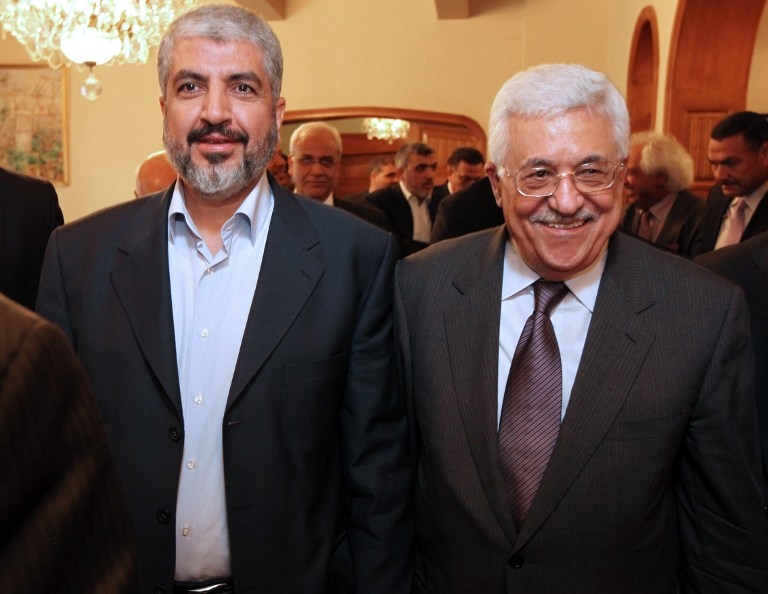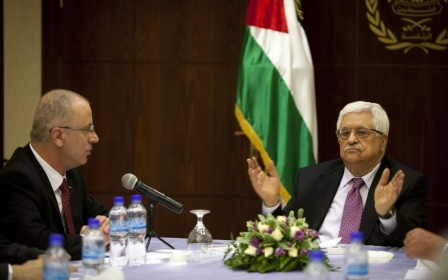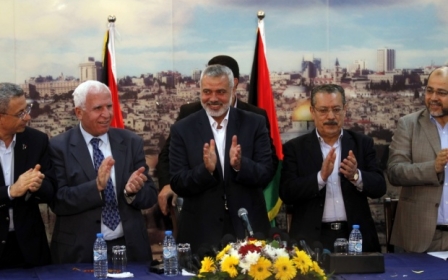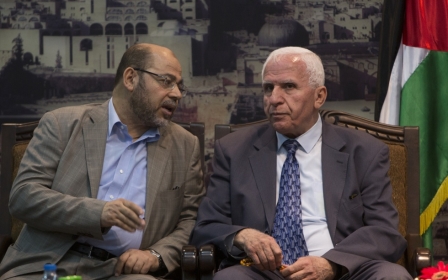Fatah and Hamas engage in war of words ahead of Cairo talks

A joint delegation from Palestinian factions Hamas and Islamic Jihad left the Gaza Strip on Monday for Cairo to participate in indirect talks with Israel on a permanent cease-fire agreement.
Hamas spokesman Sami Abu Zuhri said indirect negotiations between the two sides this week would focus on drawing up a timeline for cease-fire negotiations, as well as the agenda of talks.
He added that negotiations would officially commence under Egyptian mediation following the Muslim Eid al-Adha holiday and Jewish Yom Kippur celebrations early next month.
Palestinian and Israeli negotiators signed a cease-fire deal in Cairo on 26 August after indirect talks that lasted several days.
The cease-fire ended a 51-day military onslaught on the Gaza Strip by Israel in which more than 2,100 Palestinians were killed and some 11,000 injured.
Around 72 Israelis – including 68 army troops – were also killed over the same period, according to Israeli data, while 2,522 Israelis, including 740 troops, were injured.
Egypt's Foreign Ministry said earlier that Egypt planned to host what it described as a fresh round of "exploratory" indirect talks between Palestinian and Israeli negotiators.
"This round represents a new episode of continual consultations on fixing Gaza's cease-fire," the ministry said in a statement.
It added that the indirect talks would be preceded on Monday by meetings among Palestinian factions to discuss inter-Palestinian reconciliation and coordination in advance of the cease-fire talks with Israel.
Tensions have mounted recently between leading Palestinian factions Hamas and Fatah, the latter of which is led by Palestinian Authority President Mahmoud Abbas.
The tensions come in spite of a June reconciliation deal that produced a unity government headed by West Bank-based Prime Minister Rami al-Hamdallah.
The unity government has yet to assume political control over the Gaza Strip.
Both factions, meanwhile, continue to accuse each other of attempting to sabotage a reconciliation deal signed this summer as Hamas and the Palestinian Authority (PA) engage in a war of words in the run up to the indirect talks with Israel.
Hamas’s Abu Zuhri accused Hamallah on his official Facebook page Friday, of "still being loyal to the orders of the Fatah movement and conducting its decisions."
Hamdallah "isn't behaving according to the rules of the unity government, and ignores the rights of Gaza residents and their suffering," said Abu Zuhri. "He is reinforcing the rift and adding to the failure of the (unity) government."
Abu Zuhri's verbal barrage comes after Hamdallah earlier on Friday revealed that the crumbling unity agreement between the PA and Hamas may not be reconciled.
The prime minister instead said that all factions who signed the agreement in April are "fully responsible" for finding solutions to internal conflict - pushing the responsibility off of the unity government.
Hamas official Mahmoud Zahran had claimed late Thursday night that the unity pact was merely a "temporary measure," and that Hamas was looking for alternative solutions.
"There is no doubt (the unity government) is a failure," Zahran added.
Tensions between Hamas and Fatah have been at the boiling point lately, with Abbas last week threatening to end the unity deal over a range of issues, including Hamas allegedly instigating a coup attempt against Abbas in Judea and Samaria.
Abu Zuhri replied back saying, "Abbas's remarks against Hamas and the resistance are unjustified, and the sources of information and figures he relied on were incorrect and have nothing to do with the truth."
The deal ended seven years of rift between the two factions, which had led to the establishment of two separate seats of government – Fatah in the West Bank and Hamas in Gaza – after the latter routed troops loyal to Abbas in 2007 and assumed political control of the Gaza Strip.
Middle East Eye propose une couverture et une analyse indépendantes et incomparables du Moyen-Orient, de l’Afrique du Nord et d’autres régions du monde. Pour en savoir plus sur la reprise de ce contenu et les frais qui s’appliquent, veuillez remplir ce formulaire [en anglais]. Pour en savoir plus sur MEE, cliquez ici [en anglais].




